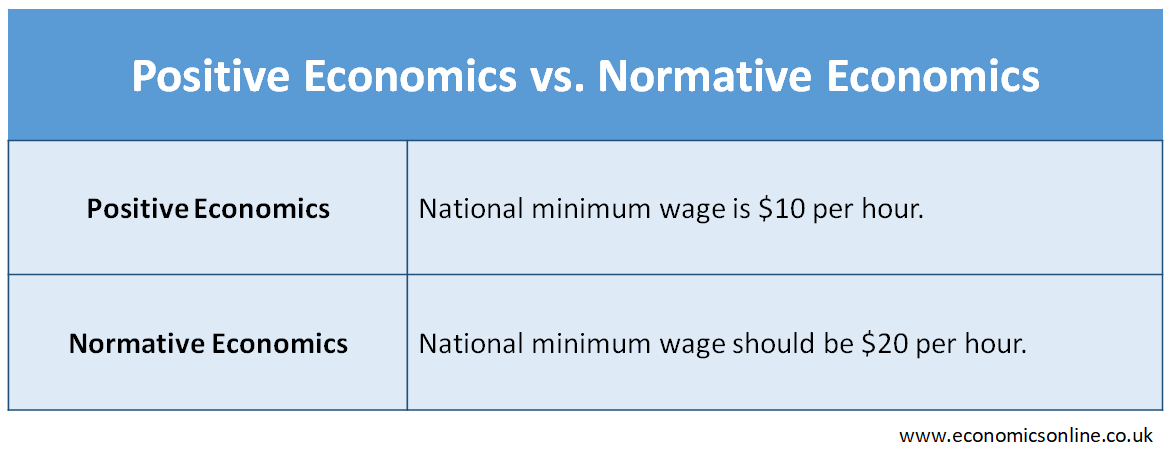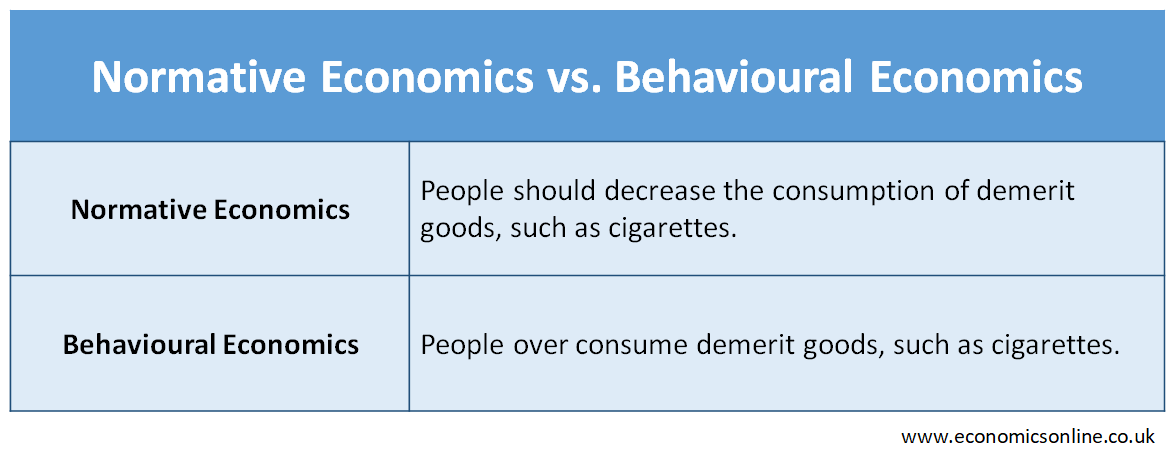
An image of people discussing a money graph.
Normative Economics and its Applications
Introduction
Economics is the study of human behaviour between limited resources and unlimited wants.
There are many branches of economics, including microeconomics, macroeconomics, behavioural economics, welfare economics, development economics, environmental economics, health economics, labour economics, econometrics, positive economics, and normative economics. In this article, we shall explain normative economics in detail.
What is Normative Economics?
Normative economics is the branch of economics that deals with subjective opinions and value judgements about economic activities.
In simple words, normative economics is about ‘what should be’ and ‘what ought to be’ rather than the facts and the laws of economics.
In contrast to positive economics, which focuses on facts, figures, and objective analysis, normative economics focuses on subjective opinions about economic policies and outcomes.
Understanding Normative Economics
Let’s try to understand what normative economics is.
Normative economics is about what economic policies and outcomes should or ought to be. This means going beyond the objectivity, facts, and laws of economics and thinking subjectively about ethical and societal considerations about economic activities.
Let’s take an example. The government has imposed a new road tax on motorists. Normative economics focuses on subjective opinions about this road tax, like, ‘the government is right in imposing the new road tax on motorist’ or ‘the new road tax on motorists is unfair.’
Thinking about morality and other subjective dimensions of economic policies and outcomes gives economists direction towards fairness and justice. That is why normative economics is considered important in terms of making economic policies.
Ethics in Normative Economics
Ethics play a significant role in normative economics. Normative economics tells us that economic decisions are not merely mathematical calculations but are deeply rooted in ethical considerations. The ethical aspect of normative economics involves a continuous dialogue on what is morally right or wrong in economic policies. For example, debates around the ethics of income redistribution, progressive taxation, and social justice form an integral part of normative economic discussions.
Normative Economics vs. Positive Economics
Normative economics deals with value judgements and subjective opinions that cannot be proven right or wrong. On the other hand, positive economics deals with objective facts and the laws of economics that can be proven right or wrong based on evidence. Positive economics focuses on how things are (objective approach), while normative economics focuses on how things should be or ought to be (subjective approach). For example, the government has increased the minimum wage from $10 per hour to $12 per hour (positive economics). The government has taken the right decision by increasing the minimum wage from $10 per hour to $12 per hour, as it will decrease poverty (normative economics).

While normative and positive economics are often treated as distinct branches, however, they are interconnected. Positive economics provides the empirical foundation, offering data and observations on how economic systems operate. Normative economics then builds upon this foundation, incorporating value judgements to offer insights into how these systems should ideally function.
Normative Economics vs. Behavioural Economics
Normative economics deals with how human behaviour should be in terms of morality and societal values. It focuses on making judgements about what is considered fair, just, or desirable in economic decision-making. On the other hand, behavioral economics focuses on understanding and explaining actual human behaviour in economic situations. It explores the idea that actual human behaviour may deviate from morality and societal values due to the psychological factors that influence actual decision-making. For example, smoking is bad for health (normative economics); however, people do smoke (behavioural economics) due to various psychological and cognitive factors.
While normative economics tells us that people should make rational and ethical decisions, behavioural economics tells us that human behaviour is complex, and sometimes people do make economic decisions that are irrational and unethical. Together, these branches contribute to a more comprehensive understanding of economic activities, blending ethical considerations with insights into the complex nature of actual human decision-making.

Normative Statements vs. Positive Statements
Statements about economic issues can be divided into normative statements and positive statements.
Normative Statements
Normative economic statements express an opinion or value judgement about how things should be.
These statements cannot be proven right or wrong because they are just opinions about how things should be. Normative economists deal with normative statements, which are value-based.
Each of the following examples of normative economics contains a value judgement:
- A fall in the supply of gas should lead to an increase in its price.
- A 10% increase in tourist numbers in the UK is likely to create at least 15% more jobs in the tourist industry.
- The inflation rate of 15% in 2022 was the worst in 12 years.
- Inflation is more harmful than unemploymentin the.
- The government should increase funding for public education to ensure equal access to quality learning opportunities.
- Progressive taxation is a fair and just way to address income inequality.
- Providing free healthcare is essential, as everyone deserves access to medical services regardless of their financial means.
- Subsidies for renewable energy sources are necessary to combat climate change.
- Government regulations are necessary to prevent market abuse and protect consumers.
- Ethical considerations should guide decisions about the development and use of emerging technologies.
Positive Statements
Positive statements are about the facts of economics or the laws of economics, which can be proven right or wrong. In positive statements, economists may analyse fact-based issues without making any value judgements (opinions). Positive statements may or may not be correct, yet they can be proven right or wrong based on empirical evidence. Positive economics deals with making positive statements.
Each of the following examples of positive economics contains no value judgement:
- The unemployment rate in the country has decreased by 2% over the last quarter.
- Increased consumer spending has led to a boost in the economy.
- Technological advancements have improved productivity in the manufacturing sector.
- The inflation rate for the current fiscal year stands at 3.5%.
- Research indicates a positive correlation between education levels and individual earning potential.
- The stock market experienced 10% growth in the past year.
- Studies show that countries with lower trade barriers tend to have higher economic growth rates.
- The GDP of the country has increased by 4% compared to the previous year.
- The trade deficit widened as imports exceeded exports by $20 billion.
- A fall in the unemployment rate will lead to a rise in the inflation rate.
Applications of Normative Economics
The following are some applications of normative economics:
Public Policy
Normative economics has applications in public policy analysis. Policymakers often consult normative economics to formulate laws and regulations that align with societal norms and values. For instance, debates on minimum wage laws, environmental regulations, and social safety nets are based on normative economics.
Resource Allocation and Efficiency
Normative economics has applications in determining how resources should be allocated to maximise social welfare. This involves evaluating the efficiency of different resource allocation mechanisms and addressing questions of equity. For example, discussions on the optimal provision of public goods and the role of government intervention are often based on normative economics.
Taxation Policy
Another application of normative economics is in designing taxation policies. By incorporating ethical considerations and societal values, economists can recommend tax systems that are perceived as fair and just. This may involve advocating for progressive taxation, where higher-income individuals contribute a larger percentage of their income, aligning with principles of income equality and social justice.
Social Welfare
Social welfare programmes are often based on normative economics. Recommendations for these economic programs are based on societal well-being, striving to address societal needs and alleviate poverty. This application includes policies related to unemployment benefits, food assistance, healthcare access, and other programmes that aim to promote a more compassionate and equitable society.
Environmental Policy
When addressing environmental issues, normative economics guides policymakers in making decisions that align with ethical considerations. This could involve the implementation of regulations and incentives to promote sustainable practises, prioritising the well-being of current and future generations over short-term economic gains.
Labour Market Regulations
Normative economics has applications in making labour laws. This includes proposals for minimum wage laws, workplace safety standards, and regulations to ensure fair and ethical treatment of workers. By considering societal values, normative economics contributes to the creation of policies that aim to balance economic efficiency with social justice.
Education Policy
Normative economics is also applicable in designing education policies and advocating for equitable access to quality education. This application involves recommendations for funding mechanisms, resource allocation, and policies that address disparities in educational opportunities. The goal is to ensure that education is accessible to all, aligning with principles of fairness and societal well-being.
Criticism on Normative Economics
Despite its importance, normative economics is not without criticism. One major criticism is the subjective nature of value judgements. Different individuals and societies may hold different perspectives, leading to disagreements on what constitutes an ideal economic outcome. This subjectivity can make normative economics vulnerable to biases.
Moreover, translating ethical principles into actionable policies is often complex. Finding a consensus on what should be done or ought to be done does not necessarily provide a clear guideline for implementation.
Future Directions in Normative Economics
Normative economics is evolving, and its future holds exciting possibilities, driven by on-going advancements in economic theory and our understanding of human behaviour.
Ethics and societal values are also dynamic in nature. Societies evolve and develop new ethical standards. What may be considered an ideal economic outcome today might not stay the same in future. As normative economics continues to adapt to contemporary challenges, it may incorporate better approaches for directing human behaviour towards making a better future.
Conclusion
In conclusion, normative economics is a branch of economics that deals with subjective opinions and value judgments about economic activities. It is different from positive economics, which focuses on objective facts. Normative economics deals with how economic decisions should align with morality and societal values, while behavioural economics studies actual human behaviour in economic situations. Some applications of normative economics include public policy, resource allocation, taxation policy, social welfare, environmental policy, labour market regulations, and education policy. Normative economics provides economists with a lens through which they evaluate not only what is but also what should be.


